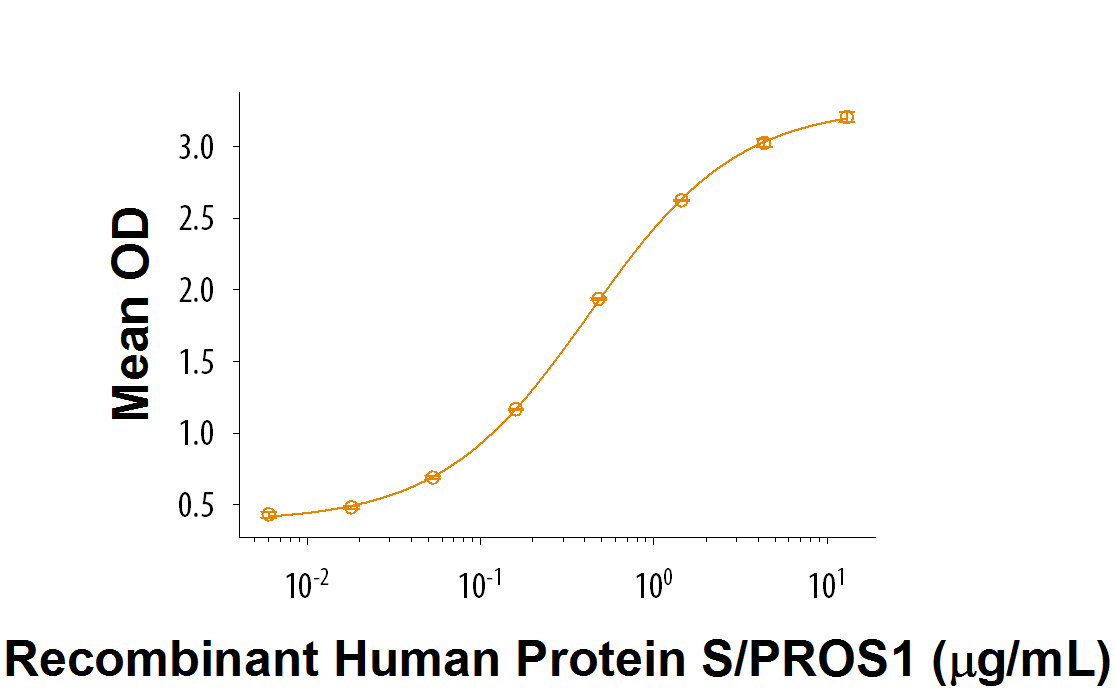Recombinant Human Protein S/PROS1, CF Summary
Product Specifications
Ala42-Trp670, with a C-terminal 10-His tag
Analysis
Product Datasheets
Carrier Free
CF stands for Carrier Free (CF). We typically add Bovine Serum Albumin (BSA) as a carrier protein to our recombinant proteins. Adding a carrier protein enhances protein stability, increases shelf-life, and allows the recombinant protein to be stored at a more dilute concentration. The carrier free version does not contain BSA.
In general, we advise purchasing the recombinant protein with BSA for use in cell or tissue culture, or as an ELISA standard. In contrast, the carrier free protein is recommended for applications, in which the presence of BSA could interfere.
9489-PS
| Formulation | Lyophilized from a 0.2 μm filtered solution in MES, NaCl and CaCl2. |
| Reconstitution | Reconstitute at 1 mg/mL in water. |
| Shipping | The product is shipped with polar packs. Upon receipt, store it immediately at the temperature recommended below. |
| Stability & Storage: | Use a manual defrost freezer and avoid repeated freeze-thaw cycles.
|
Scientific Data
 View Larger
View Larger
When Recombinant Human Tyro3/Dtk Fc Chimera (Catalog # 859-DK) is immobilized at 1 µg/mL, 100 µL/well, Recombinant Human Protein S/PROS1 (Catalog # 9489-PS) binds with an ED50 of 0.2-1.2 µg/mL.
Reconstitution Calculator
Background: Protein S/PROS1
Anticoagulant Protein S (PROS1) is a 71 kDa plasma vitamin K-dependent glycoprotein characterized by the presence of the post-translational modification of specific glutamic acid residues to gamma-carboxyglutamic acid (Gla) in the N-terminal region. In addition to the N-terminal Gla domain, mature PROS1 contains a thrombin‑sensitive thumb loop, four tandem EGF-like domains and a C-terminal sex hormone-binding globulin (SHBG) domain composed of two Laminin G (LG) domains (1). Human PROS1 shares 80% amino acid sequence identity with mouse PROS1. Hundreds of mutations have been reported throughout all the domains of the protein, typically resulting in PROS1 deficiency and an increase in the risk of thrombophilia (2, 3). PROS1 is expressed in many cell types supporting its reported involvement in multiple biological processes that include coagulation, apoptosis, cancer development and progression, and the innate immune response (4-9). PROS1 exists in plasma both in complex with C4b-binding protein (C4BP) (60%) and in a free form (40%). Both forms of PROS1 have anti-coagulant activity either directly through inhibition of Factor X systems and prothrombinase while in complex with C4BP (5, 10) or in its well-established role as a cofactor of activated protein C (APC) inactivation of procoagulants FVa and FVIIIa (4). The free form of PROS1 is also a ligand for a subfamily of receptor tyrosine kinases known as TAMs, which is composed of TYRO3, AXL, and MERTK (11). PROS1 binds these tyrosine kinase receptors through its LG domains to activate downstream signaling pathways involved in tumor development and progression (7, 8, 11, 12).
- Dahlback, B. et al. (1986) Proc. Natl. Acad. Sci. 83:4199.
- Garcia de Frutos, P. et al. (2007) J. Thromb. Haemost. 98:543.
- Heeb, M. J. (2008) Expert Rev. Hematol. 1:9.
- Walker, F.J. (1984 Sem. Thromb. Hemosta. 10:131.
- Heeb, M. J. et al. (2004) J. Thromb. Haemost. 2:1766.
- Che Mat, M. F. (2016) Int. J. Oncol. 49:2359.
- Abboud-Jarrous, G. et al. (2017) Oncotarget. 8:13986.
- Qin, J. et al. (2016) Sci. Rep. 6:26662.
- Davra, V. et al. (2016) Cancers (Basel). 8:E107.
- Hackeng, T. M. et al. (1994) J. Biol. Chem. 269:21051.
- Tsou, W.I. et al. (2014) J. Biol. Chem. 289:25750.
- Linger, R.M.A. et al. (2008) Adv. Cancer Res. 100:35.
Citation for Recombinant Human Protein S/PROS1, CF
R&D Systems personnel manually curate a database that contains references using R&D Systems products. The data collected includes not only links to publications in PubMed, but also provides information about sample types, species, and experimental conditions.
1 Citation: Showing 1 - 1
-
Mer regulates microglial/macrophage M1/M2 polarization and alleviates neuroinflammation following traumatic brain injury
Authors: H Wu, J Zheng, S Xu, Y Fang, Y Wu, J Zeng, A Shao, L Shi, J Lu, S Mei, X Wang, X Guo, Y Wang, Z Zhao, J Zhang
Journal of Neuroinflammation, 2021-01-05;18(1):2.
Species: Mouse
Sample Types: In Vivo
Applications: Bioassay
FAQs
No product specific FAQs exist for this product, however you may
View all Proteins and Enzyme FAQsReviews for Recombinant Human Protein S/PROS1, CF
Average Rating: 4 (Based on 1 Review)
Have you used Recombinant Human Protein S/PROS1, CF?
Submit a review and receive an Amazon gift card.
$25/€18/£15/$25CAN/¥75 Yuan/¥2500 Yen for a review with an image
$10/€7/£6/$10 CAD/¥70 Yuan/¥1110 Yen for a review without an image
Filter by:

